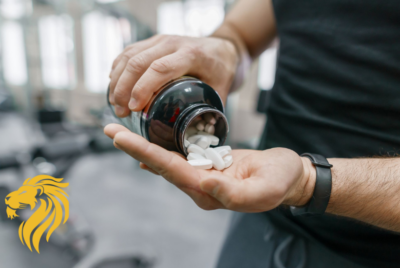Feeling Low on T
Feeling Low T
Many men experience a dip in energy, mood, and overall well-being as they age. This can often be attributed to a decline in testosterone (T) levels; commonly known as Feeling Low on T.
This article dives deep into the world of low testosterone, exploring the signs, symptoms, treatment options, and lifestyle changes that can help you feel like yourself again.
1. Is Low T Holding You Back? Recognizing the Signs and Symptoms
Feeling sluggish, irritable, and lacking your usual zest for life? Low testosterone (Low-T) could be the culprit. While a decrease in sex drive is a common symptom, Low-T can manifest in various ways. These include:
• Reduced libido: A noticeable decline in sexual desire can be a significant indicator of low T.
• Erectile dysfunction (ED): Difficulty achieving or maintaining an erection can be frustrating and impact your sex life.
• Fatigue: Feeling constantly tired, even after a good night’s sleep, can be a sign of low testosterone.
• Loss of muscle mass: You might notice a decrease in muscle definition and an increase in body fat.
• Mood changes: Irritability, low mood, and even symptoms of depression can be linked to low T.
• Changes in sleep patterns: Experiencing difficulty sleeping or waking up frequently at night can disrupt your energy levels.
• Decreased bone density: Low testosterone can weaken bones, increasing the risk of fractures.
• Loss of body hair: Thinning facial and body hair can be a visual indicator of low testosterone levels.
If you’re experiencing several of these symptoms, it’s crucial to consult a doctor for proper diagnosis.
2. Beyond the Bedroom: How Low T Impacts Your Overall Health
Low testosterone affects more than just your sex life. It plays a vital role in various bodily functions, and a deficiency can have a cascading impact on your health. Here’s how:
• Reduced energy levels: Low T can lead to fatigue, making it harder to maintain an active lifestyle and complete daily tasks.
• Weakened bones: As mentioned earlier, low testosterone can decrease bone density, increasing the risk of osteoporosis and fractures.
• Increased risk of heart disease: Low T might be linked to higher cholesterol levels and an increased risk of heart problems.
• Mood swings and depression: Low testosterone can contribute to feelings of sadness, irritability, and even depression.
• Cognitive decline: Studies suggest a possible link between low T and memory problems or difficulty concentrating.
If you suspect low T, addressing it can improve your overall health and well-being, not just your sex life.
3. Don’t Suffer in Silence: Talking to Your Doctor About Low Testosterone
Feeling the effects of low T can be isolating and frustrating. But remember, you’re not alone! Many men experience testosterone decline, and the good news is there are effective treatments available. The key is to have an open and honest conversation with your doctor.
Here’s how to prepare for a productive discussion:
• Make a list of your symptoms: Having a clear picture of what you’re experiencing helps the doctor understand your situation.
• Be specific about any changes you’ve noticed: This might include decreased libido, erectile dysfunction, fatigue, or mood swings.
• Gather any relevant medical history: Mention any pre-existing conditions or medications you’re taking.
• Don’t hesitate to ask questions: Don’t be shy! The doctor is there to guide you through the process.
By being proactive and open with your doctor, you can get the proper diagnosis and explore treatment options that can significantly improve your quality of life.
4. Lifestyle Changes for a Natural T-Boost: Diet, Exercise, and Sleep
While testosterone replacement therapy (TRT) is an option, there are also lifestyle changes that can naturally support healthy testosterone levels. Here are three key areas to focus on:
• Diet: Maintaining a balanced diet rich in fruits, vegetables, and whole grains provides essential nutrients that can support testosterone production. Incorporate healthy fats like those found in fish, avocados, and nuts, and limit processed foods, sugary drinks, and excessive red meat.
• Exercise: Regular physical activity, especially strength training, can significantly improve testosterone levels. Include exercises that target major muscle groups and aim for at least 30 minutes of moderate-intensity exercise most days of the week.
• Sleep: Getting enough quality sleep (7-8 hours per night) is crucial for overall health and hormone regulation. Prioritize good sleep hygiene by establishing a regular sleep schedule, creating a relaxing bedtime routine, and optimizing your sleep environment.
These lifestyle modifications may not dramatically increase testosterone levels, but they can contribute to a healthier lifestyle and potentially offer a slight natural boost. Remember, consistency is key! By incorporating these changes into your daily routine, you can support your overall health and well-being.
5. Exploring Treatment Options: Understanding Testosterone Replacement Therapy (TRT)
If lifestyle changes haven’t addressed your low T symptoms, testosterone replacement therapy (TRT) might be an option. TRT aims to restore testosterone levels to a normal range, potentially alleviating symptoms and improving overall health. Here’s a breakdown of TRT:
• Forms of TRT: TRT comes in various forms, including gels, patches, injections, and pellets implanted under the skin. You and your doctor will discuss the best option based on your needs and preferences.
• Benefits of TRT: Studies have shown TRT can improve sex drive, erectile function, energy levels, mood, and muscle mass. It can also help maintain bone density.
• Potential side effects: While generally safe when used appropriately, TRT can have side effects like acne, increased red blood cell count, and breast tenderness.
Remember, TRT is a medical treatment, and it’s crucial to discuss it thoroughly with your doctor to understand the potential benefits and risks.
6. Weighing the Risks and Benefits: Making Informed Decisions About Low T Treatment
Considering TRT? It’s vital to weigh the potential benefits against any risks before making a decision. Here’s what to consider:
• Individual needs and health: Discuss your specific symptoms and overall health with your doctor. They can assess if TRT is right for you and address any pre-existing conditions.
• Benefits vs. Risks: Understand the potential improvements in symptoms and quality of life alongside possible side effects of TRT.
• Long-term commitment: TRT is typically a lifelong treatment. Discuss the ongoing monitoring and potential adjustments needed to maintain optimal testosterone levels.
By having an open and honest conversation with your doctor, you can make an informed decision about whether TRT is the right path for you.
7. Myths and Misconceptions Debunked: Separating Fact from Fiction About Testosterone
There’s a lot of misinformation floating around about testosterone. Let’s clear the air and separate fact from fiction:
• Myth: Low T is just a normal part of aging.
• Fact: While testosterone levels naturally decline with age, a significant drop can be a medical issue.
• Myth: Testosterone only affects sex drive.
• Fact: Low T impacts energy levels, mood, muscle mass, bone density, and overall well-being.
• Myth: Testosterone makes you angry and aggressive.
• Fact: While mood swings can occur with low T, TRT doesn’t necessarily increase aggression.
• Myth: Testosterone replacement therapy is a magic bullet.
• Fact: TRT is a medical treatment with potential benefits and risks. It should be tailored to individual needs.
• Myth: Testosterone makes your voice deeper and gives you excessive body hair.
• Fact: These changes are more prominent during puberty due to testosterone’s initial surge. TRT effects may vary.
By understanding the facts about testosterone, you can make informed decisions about your health.
8. Boost Your Confidence and Vitality: The Potential Benefits of Increased Testosterone
Optimizing your testosterone levels through lifestyle changes or TRT (if medically appropriate) can offer a range of benefits:
• Enhanced libido and sexual function: Increased testosterone can improve sex drive and erectile function.
• Increased energy levels: Feeling more energized throughout the day allows you to be more active and productive.
• Improved mood and well-being: Balanced testosterone levels can contribute to better mood, reduced irritability, and increased motivation.
• Improved muscle mass and strength: Testosterone plays a role in muscle growth and strength, potentially aiding in building and maintaining muscle mass.
• Increased bone density: Adequate testosterone levels can help maintain stronger bones and reduce the risk of osteoporosis.
• Improved cognitive function: Studies suggest a possible link between optimized testosterone levels and improved cognitive function, memory, and focus.
Remember, these are potential benefits, and individual results may vary. However, addressing low T can significantly improve your quality of life and overall well-being.
9. Long-Term Management Strategies: Maintaining Optimal Testosterone Levels
If you choose to pursue TRT, it becomes a long-term commitment. Here’s how to ensure optimal testosterone levels and manage your treatment effectively:
• Regular doctor visits: Schedule regular check-ups with your doctor to monitor your testosterone levels and adjust your TRT dosage as needed.
• Blood tests: Regular blood tests are crucial to monitor testosterone levels, red blood cell count, and any potential side effects.
• Lifestyle modifications: Maintaining healthy lifestyle habits like a balanced diet, regular exercise, and quality sleep can further support your overall health and potentially enhance the effects of TRT.
• Open communication: Don’t hesitate to discuss any concerns or changes in symptoms with your doctor. They can adjust your treatment plan accordingly.
By being proactive and working closely with your doctor, you can effectively manage your testosterone levels and experience the long-term benefits of TRT.
10. Feeling Low T? You’re Not Alone: Finding Support and Community
It’s important to remember that you’re not alone in experiencing low testosterone. Many men face similar challenges. Here’s how to find support and connect with a community:
• Talk to your doctor: Your doctor can be a valuable resource and may connect you with support groups or educational resources.
• Online communities: Join online forums or groups dedicated to men’s health and low testosterone. Share your experiences and connect with others on a similar journey.
• Men’s health organizations: Organizations like the American Urological Association offer resources and information about low T.
Having a support system can be invaluable. Sharing your experiences and connecting with others who understand can alleviate feelings of isolation and empower you to manage your health effectively.
Remember, this article provides general information and shouldn’t be a substitute for professional medical advice. If you suspect low testosterone, consult your doctor for a diagnosis and personalized treatment plan.
11. Conclusion: Feeling Low on T
Feeling low T can significantly impact your quality of life. The good news is there are steps you can take to address it. This article explored the signs and symptoms of low testosterone, treatment options like TRT, and the importance of lifestyle changes.
Remember, you’re not alone. Many men face similar challenges, and there are resources and support systems available.
Take charge of your health! If you suspect low T, schedule an appointment with your doctor to discuss your concerns and explore potential solutions. With proper diagnosis and management, you can reclaim your vitality and live a fulfilling life.
12. FAQ with Answers: Feeling Low on T
1. What are the main symptoms of low testosterone?
Common symptoms include reduced sex drive, erectile dysfunction, fatigue, loss of muscle mass, increased body fat, mood swings, and difficulty sleeping.
2. How is low testosterone diagnosed?
A doctor will typically discuss your symptoms, perform a physical exam, and order blood tests to measure testosterone levels.
3. What are the different forms of testosterone replacement therapy (TRT)?
TRT comes in various forms like gels, patches, injections, and implantable pellets. Your doctor will recommend the best option for you.
4. Are there any side effects associated with TRT?
While generally safe, TRT can have side effects like acne, increased red blood cell count, and breast tenderness. Discuss these risks with your doctor.
5. What lifestyle changes can help with low testosterone?
Maintaining a healthy diet, engaging in regular exercise, and prioritizing quality sleep can all support natural testosterone production.
Remember, this information is intended for general knowledge and shouldn’t replace professional medical advice. Consult your doctor for personalized guidance on low testosterone.
https://wisconsinurology.com/our-services/men/low-testosterone/
Urology Care Foundation: This is a patient education foundation from the American Urological Association. They have a page specifically on low testosterone symptoms, diagnosis, and treatment




